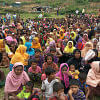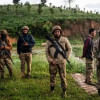US stops short of rebuking Myanmar
The Trump administration has expressed concern over the unfolding violence in Myanmar's Rakhine State, but stopped short of criticising the country's government or its de facto leader Aung San Suu Kyi.
In a phone briefing with reporters, Deputy Assistant Secretary of State for East Asian and Pacific Affairs Patrick Murphy on Friday said the United States is focused on expanding humanitarian and media access in the region, reports CNN.
The US condemns a "variety" of attacks -- "attacks on security forces, attacks on civilians (and) attacks by civilians", he said.
Murphy further said they are very concerned by the “sustained allegations of abuses” that are resulting in the displacement of many. "We're urging all parties to take steps to calm tensions."
But he was careful not to directly criticise the country's civilian government, which he said represents the "best opportunity in generations for Burma to get on the right track". The government, he added, "inherited a host of enormous challenges."
At the White House, Press Secretary Sarah Sanders told reporters that President Donald Trump was "aware of the situation and monitoring." She said she wasn't aware if Trump has spoken to Suu Kyi since becoming president, ABC news reports.
State Department officials, however, say they've been in regular contact with Myanmar's government, primarily through US envoy Scot Marciel.
In his call with reporters, Murphy termed those discussions productive and ongoing, and said the US is finding "very willing partners within the government."
Diplomatic sources in Dhaka and Washington say such gentle persuasion on Myanmar doesn't appear to be working.
The US earlier had led global efforts to bring democracy to Myanmar and supported Suu Kyi's rise to power, but the prospects of Washington leading a new pressure campaign appear slim.
It is also seemingly reluctant to condemn brutalities on Rohingyas when international concerns and protests grow over the persecution of the minority group and their exodus from Myanmar to Bangladesh reached over a quarter million.
Contacted by The Daily Star, former Bangladesh ambassador in Washington, Humayun Kabir, however, said, “There is some movement in the US and the policymaking circles are showing sensitivity on the uneasiness on the Rohingya situation.
“We can gain the US support on this issue if there are sustained and effective diplomatic efforts on Bangladesh government side.”
He observed that Bangladesh is showing maximum restraint and remain unprovoked as it is trying to resolve the crisis peacefully with Myanmar.
LETTER FROM UK PARLIAMENTARIANS
A total of 157 British parliamentarians urged their government to exert more pressure on the Myanmarese government to stop violence on Rohingya people, BSS reported yesterday.
"The scale of the human rights and humanitarian crisis unfolding in Myanmar is unprecedented in its recent history. It requires the attention of the British government at the highest level," they said in a letter to British Foreign Secretary Boris Johnson on Wednesday.
According to the letter signed by Co-Chair of All Party Parliamentary Group for Democracy in Burma Rushanara Ali, MP, and obtained by BSS yesterday, the parliamentarians hoped that as in the past, the government would show global leadership in support of the people of Myanmar as they face in this new crisis.
The letter read, "It appears that the military is using the attacks as a pretext for the mass clearance of the Rohingya population from large parts of Northern Rakhine State rather than seeking to arrest militants from Arakan Rohingya Salvation Army (Arsa) involved in attacks against government buildings on August 25."
The Independent reported that Boris Johnson has been urged by 157 MPs and peers to suspend Britain's training of the Myanmarese armed forces.
He has already warned Suu Kyi that the treatment of the ethnic minority group is "besmirching" the country's reputation.
The parliamentarians welcomed his statement but urged the Government to suspend British training of the Myanmarese military, which cost the UK around £305,000 last year, given reports of beheadings, rape and children being deliberately shot.
'TERRIBLE SIGNAL'
Meanwhile, American Jewish leaders have called upon the Trump administration to aid the Rohingyas fleeing Myanmar, The Jerusalem Post reported.
Robert Bank, CEO of the American World Jewish Service, called on the government to end the systemic violence against the Rohingya people, send humanitarian aid, and do all it can to ensure that human rights fact-finding groups - including the UN - be allowed to enter Myanmar to investigate the situation.
In his statement, Bank invoked the Holocaust and the idea that Jews have a deep understanding of the horrors of genocide and of being a persecuted ethnic minority.
In another development, the US Holocaust Memorial Museum, which has previously warned of the risk of genocide in Myanmar, says the widespread destruction of homes and villages suggests "an effort to ethnically cleanse the region of its Rohingya population and to prevent their eventual return”.
Not wanting to undermine the Asian country's democratic hero, the US is cautiously criticising what looks like a forced exodus of more than a quarter-million Rohingya in the last two weeks as Myanmar's military responds with hammer force to insurgent attacks, according to a report of ABC News yesterday.
Republican and Democratic lawmakers, traditionally in the vanguard of Myanmar policy, have denounced the military's conduct and strongly urged intervention by Suu Kyi, a Nobel Peace laureate who has courted unprecedented criticism for dismissing the crisis as a misinformation campaign.
But the Trump administration is neither readying sanctions nor levying real pressure on Suu Kyi's government. Rather a bill making its way through Congress even talks about enhancing US-Myanmar military cooperation.
"Further normalisation of the military-to-military relationship with Burma is the last thing we should be doing right now," said Walter Lohman, Asia Programme Director at the right-leaning Heritage Foundation. "What a terrible signal to be sending."
Cameron Hudson, director of the Holocaust Memorial Museum's Simon-Skjodt Centre for the Prevention of Genocide, on Friday said, “The government efforts to deny Rohingya citizenship rights, restrict their freedom of movement and the practice of their faith, and deny their basic human rights have all been identified as leading precursors to genocide.”
In 2012, the museum awarded Suu Kyi the Elie Wiesel Award, its highest honour. Now, it says the ideals that she inspired “appear absent” in the defence of Rohingya.
The museum says it implores Suu Kyi to use her position in government and her “even more powerful voice to uphold those very ideals and work to stop the longstanding persecution and violence that threaten the very existence of Rohingya in Myanmar.”
The Refugees International, an independent humanitarian organisation, accuses the military in Myanmar of blocking life-saving aid and rights abuses, "which we believe amount to ethnic cleansing and crimes against humanity."
It called for re-imposition of sanctions targeting military officials, such as visa bans and asset freezes, and international accountability for officers implicated in wrongdoing.

 For all latest news, follow The Daily Star's Google News channel.
For all latest news, follow The Daily Star's Google News channel. 








Comments